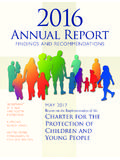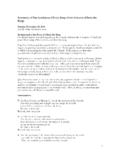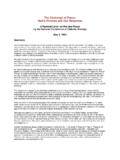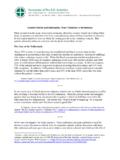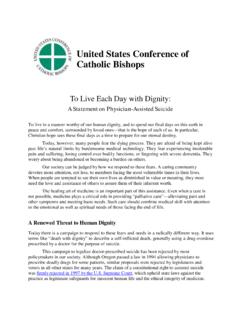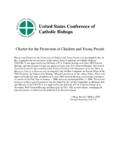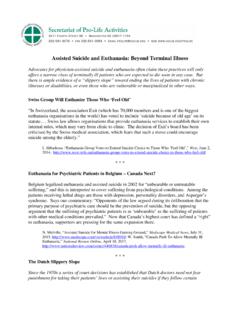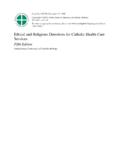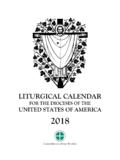Transcription of May 1, 2018 - usccb.org
1 1 May 1, 2018 The Honorable Kevin Brady Chairman Committee on ways and Means house of Representatives Washington, 20515 Re: Support for the Child Welfare Provider Inclusion Act of 2017 ( 1881) Dear Chairman Brady: We write on behalf of millions of Americans who are deeply concerned about the conscience rights of adoption and foster care providers that seek to assist children in desperate need of loving homes. The Child Welfare Provider Inclusion Act of 2017 ( 1881) protects child welfare providers from being discriminated against by government entities due to the providers religious beliefs or moral convictions. The Inclusion Act prevents the federal government and states that receive federal funds for child welfare services from excluding adoption and foster care agencies because of their beliefs about what is best for each child.
2 The Inclusion Act keeps kids first because it empowers a larger number of child welfare providers to recruit and train more loving families that can provide loving homes for more vulnerable children. Many child welfare providers have been unjustly excluded from serving children, including in Massachusetts, Illinois, California, and the District of Columbia; in each of these places, faith-based agencies were driven out of offering adoption and foster care services due to their deeply held convictions. As Steve Roach, Executive Director of Catholic Charities of Springfield, Illinois, put it: It is unconscionable that governments would take punitive action over this issue with reputable agencies when they constantly struggle to find quality homes for the abused.
3 This is the real harm being done it is being done to vulnerable children. The Inclusion Act would provide a remedy to this government discrimination by allowing providers to serve parents and children in a manner consistent with the providers religious beliefs and moral convictions. Birth parents who desire to place their children for adoption should be able to choose an agency that shares their values. In particular, keeping kids first involves protecting the birth mother s choice to place the child with the family she feels is best. According to one birth mother, I chose Bethany [Christian Services] because their values match mine.
4 Their values match my family s values, and I wanted to choose adoptive parents that share those same values. I can t even fathom, first of all, not having spiritual support from an adoption agency. 2 Single birth mothers often plan for adoption in those cases in which they cannot provide everything their child deserves. A birth mother should have every opportunity to place her child with a family that reflects her values. Taking away faith-based agencies will reduce options, make the process for birth parents even more difficult, and potentially discourage adoptions. Likewise, prospective adoptive and foster parents should also be able to choose to work with an agency that can provide spiritual support for them during the home study process and beyond, including post-placement and post-adoption services.
5 The Inclusion Act recognizes and respects this parental choice. At a time when the opioid crisis is driving more children into foster care and adoption, we need all available agencies to assist with placing vulnerable children in stable homes. Faith-based agencies in particular excel at recruiting good families who can provide stability for children in crisis; that excellence is propelled by both the faith-driven mission of these agencies as well as their connections to houses of worship where they can recruit prospective foster and adoptive parents. Many states are recognizing the need to protect adoption and foster care providers and are taking action themselves.
6 Seven states (Virginia, Michigan, North Dakota, South Dakota, Alabama, Mississippi, and Texas) have now enacted legislation to protect the conscience rights of adoption and foster care providers. At the same time, everyone who desires to foster or adopt a child still has that ability in every state (provided they meet the basic eligibility requirements). There is clearly momentum for protecting the freedom to serve vulnerable children. Such legislation has bipartisan support. Democratic State Sen. Eddie Lucio joined Republicans in Texas to support a state bill (called the Freedom to Serve Children Act), stating that it would assist in adding more private adoption agencies to Texas s system: It s about increasing capacity, it s about providing homes for kids.
7 But action is needed at the federal level as well. We offer our strong support for the federal Child Welfare Provider Inclusion Act of 2017 and urge your committee to give a high priority to the enactment of the bill this year. The freedom to serve the vulnerable according to one s conscience is foundational to our country. Sincerely, Most Rev. Frank J. Dewane Bishop of Venice Chairman, usccb Committee on Domestic Justice and Human Development Most Rev. Joseph E. Kurtz, Archbishop of Louisville Chairman, usccb Committee for Religious Liberty Most Rev. James D. Conley Bishop of Lincoln Chairman, usccb Subcommittee for the Promotion and Defense of Marriage Bethany Christian Services Catholic Charities USA Buckner International 3 Dr.
8 Russell Moore President Southern Baptist Ethics & Religious Liberty Commission Union of Orthodox Jewish Congregations of America Rev. Douglas E. Clay General Superintendent Assemblies of God (USA) Rev. Jay Mooney Executive Director Assemblies of God Family Services Agency, Dba COMPACT Family Services Rev. Dr. Matthew C. Harrison President Lutheran Church Missouri Synod Rev. Dr. Gregory P. Seltz Executive Director Lutheran Center for Religious Liberty Michael Farris President, CEO, and General Counsel Alliance Defending Freedom Tony Perkins President Family Research Council Tim Chapman Chief Operating Officer Heritage Action for America Tim Schultz President 1st Amendment Partnership Benjamin Bull Executive Director of Advocacy First Liberty Institute Joseph A.
9 Bingham Counsel First Liberty Institute Penny Young Nance CEO and President Concerned Women for America Legislative Action Committee Paul Weber President & CEO Family Policy Alliance Rabbi Pesach Lerner President Coalition for Jewish Values Patrick Purtill Director of Legislative Affairs Faith & Freedom Coalition David Nammo Executive Director & CEO Christian Legal Society Kim Colby Director Center for Law & Religious Freedom of the Christian Legal Society David Stevens, MD, MA (Ethics) CEO Christian Medical Association Jonathan Imbody Director Freedom2 Care Shepherd Smith President Institute for Youth Development Anita Smith President Children s AIDS Fund International 4 Dr.
10 Carl Herbster President AdvanceUSA Austin Ruse President C-Fam
